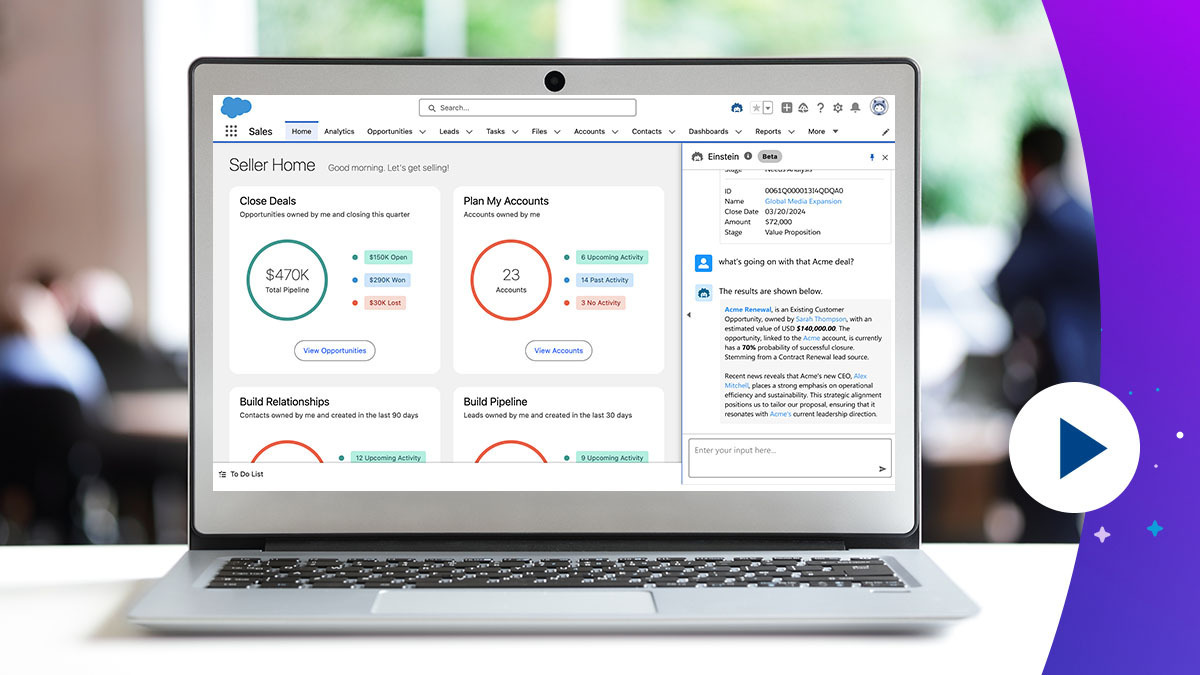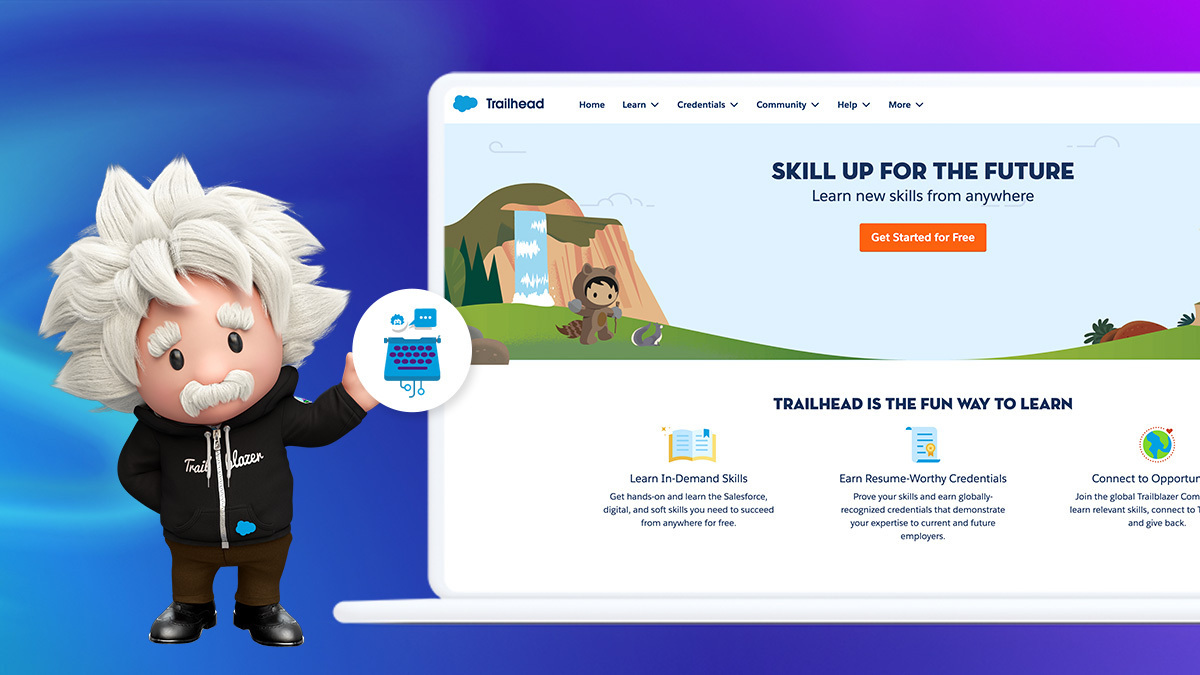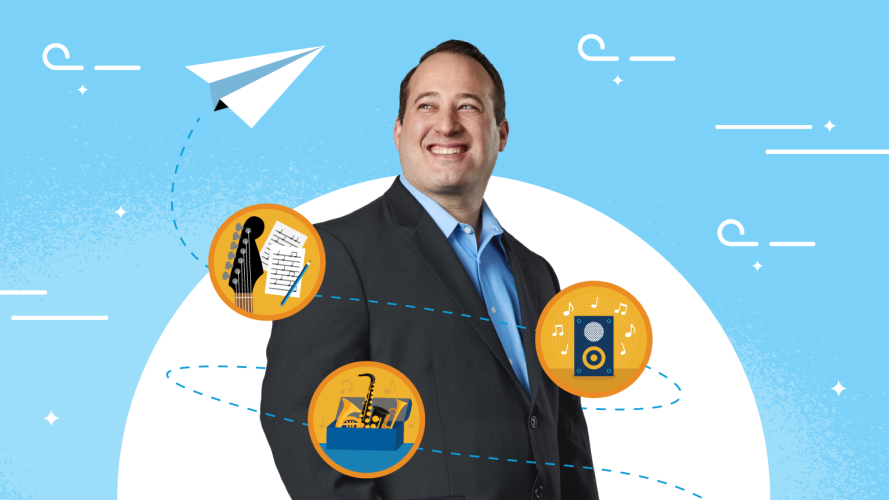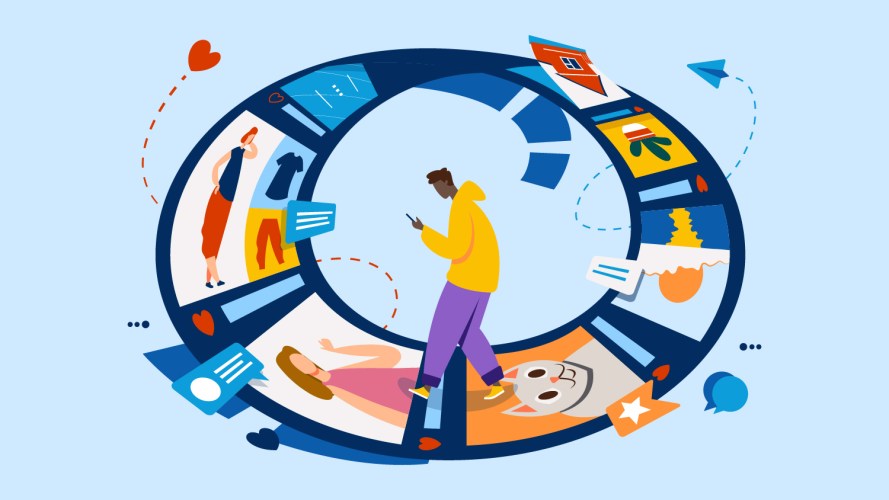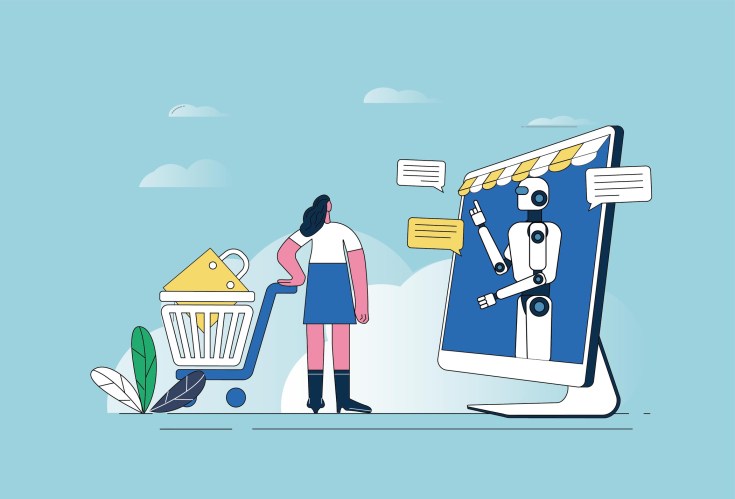Your One-Stop Guide to AI in Marketing

Great marketing comes from strong data, targeting, content, and workflows. AI makes them easier to create, maintain, and scale. Here’s how.

Jay Wilder
There’s been a lot of buzz lately about how marketers can use AI to enhance customer experiences and productivity. But for AI in marketing to fully reach its potential, we need to truly understand how it works and how to deploy it.
Think of AI as a vehicle with the ability to deliver all the customer insights you need and want. You can market more efficiently and create personalized content that customers love. The vehicle is definitely a fast-moving one, but don’t panic – we’re here to show you how to be confident in the driver’s seat.
What’s next for generative AI and marketing?
Learn what’s ahead for this new technology and new ways you can use it to connect with your customers. Our latest research tells you all you need to know.



In this piece, we’ll explain the challenges and benefits of AI in marketing, including ways you can use it to win customers, track analytics, and make the most of your investment. We’ll address best practices and identify a few future trends, and we’ll share two real-world examples of companies successfully marketing with AI.
Let’s get started.
What you’ll learn
- What is AI in marketing?
- How can AI in marketing help me reach my customers and personalize their experience?
- What are AI marketing analytics to track?
- How using AI in marketing can improve ROI
- What are the challenges of AI in marketing?
- What are the best practices for AI in marketing?
- What is an AI copilot?
- What’s ahead for AI in marketing
What is AI in marketing?
AI works by processing data with algorithms and pattern recognition to simulate human intelligence. It uses machine learning and deep learning to identify trends, make predictions, and perform digital tasks that would typically require human intelligence and decision making.
Just like you get better at something the more you practice, AI gets smarter as it learns more. It can quickly figure out what a person might like to see, read, or buy based on the data it has captured. This is machine learning.
There are two types of AI in marketing that are most important for you: predictive AI and generative AI. Predictive AI analyzes patterns in data to anticipate what outcome might happen next. For example, it can tell you which products a customer is likely to purchase based on their past buying behavior.
Generative AI helps marketers create new content by creating new text and images based on the patterns it has learned from the data it was trained on. For example, generative AI can make realistic images or produce writing resembling human-generated content in response to a marketer’s input.
The two complement each other in a few different ways. Predictive AI provides insights based on historical data, and generative AI can use this information to create new, relevant content or solutions that can be tailored to specific user needs at speed and scale.
Marketers can use them both to automate repetitive tasks, segment audiences, and deliver personalized messaging to consumers based on their preferences and behaviors. (Back to top)
How can AI in marketing help me reach my customers and personalize their experience?
AI is a powerful tool for marketers. In a process referred to as lookalike modeling, the technology recognizes the common traits and characteristics shared by your top customers. This means you are one step closer to targeting customers with similar attributes likely to be interested in your products or services.
If you don’t already have the data you need, AI can help collect it by refining your data collection methods, parsing through vast amounts of information to pinpoint key insights and trends. These capabilities can help your team tailor marketing strategies that get results.
Because AI systems are designed to be user-friendly, the more marketing teams interact with natural language prompts, the better they become at articulating specific requests or prompts. The more effective the prompt output, the bigger the potential audience reach. A broader spectrum of customers will unfold as tailored content gets better and better.
Also, generative AI can help you reach consumers with different backgrounds and interests. For example, using AI in marketing can help you create content that reflects different cultural perspectives, making your messaging inclusive and accessible for a broader audience. Using generative AI increases your chances to understand and represent the preferences of your unique customer segments.
AI can also help you with retargeting, which is when we engage with the same customer multiple times with improved messaging. Automatic retargeting using AI means you can continuously learn from each customer interaction or conversion, optimizing future content and marketing strategies based on the insights. The process of learning and adapting ensures the content remains relevant and compelling.
It’s anticipated that going forward, generative AI will be able to produce even more nuanced content, including videos, music, and images. This shift in content creation will help enhance customer engagement as the output will resonate with the marketer’s target audiences. (Back to top)
What are AI marketing analytics to track?
AI-powered algorithms and machine learning techniques help marketers process and analyze datasets fast. Unlike traditional analysis, AI analytics can handle and sort larger datasets in real time. It can also identify complex patterns and correlations within the data, uncovering valuable connections and trends.
Marketers who use AI tools built directly into software platforms can track attribution modeling, performance insights, and customer insights.
- AI attribution modeling assigns credit to various marketing touchpoints that contribute to a desired outcome, providing insights into the effectiveness of different marketing channels and campaigns.
- AI performance insights provide comprehensive and actionable information on the effectiveness of your marketing strategies and campaigns.
- AI customer insights analyze customer data, predicting behaviors such as propensity to churn, propensity to buy, and suggesting next-best-action for personalized engagement and retention strategies.
The ability to process large datasets helps marketers make data-driven decisions that lead to optimization of strategies for improved performance and ROI. (Back to top)
How using AI in marketing can improve ROI
We know businesses can expand their audience size and reach with AI-driven insights and targeting capabilities. We also know how using AI in marketing can enhance conversion rates by delivering personalized content and product recommendations. The same is true for audience retargeting, in which AI nurtures relationships with tailored messaging.
On top of that, AI’s advanced reporting and analytics capabilities enable in-depth and real-time insights into campaign performance. As a result, you can make decisions based on better data. With the power to automate tasks and streamline processes, you can handle larger workloads without additional operational burden.
Automation frees up time for marketers to focus on innovation such as:
- Immersive technologies like augmented reality (AR) and virtual reality (VR)
- Voice search optimization and voice-based marketing strategies
- Sustainable and ethical marketing practices
- Influencer marketing and the development of targeted content for niche audiences
When marketers have the time to focus on strategy, their business is more likely to find repeat business and increased ROI. (Back to top)
Explore the possibilities
Take a tour of the full Marketing Cloud offerings and see how you can build trust with AI and customer data right in your CRM.



What are the challenges of AI in marketing?
Marketing with AI helps you understand customer behavior and personalize the timing, targeting, and content of marketing activities. But it’s not without its challenges.
- Ethical concerns about data privacy, security, and consumer trust call for compliance and regulations to safeguard customer information.
- Technical expertise is vital for successful AI integration, so training up a skilled workforce capable of optimizing tools and platforms can be a hurdle.
- Poor data quality can lead to inaccurate insights and flawed decision-making. Ensuring proper data quality with unified customer profiles is crucial.
- Good AI relies on a solid data foundation. It also relies on making the outputs of AI usable in the flow of work. Often, companies want to use more data science models from across the company’s data and find it hard to integrate into their workflow. (Back to top)
What are the best practices for AI in marketing?
Keep these 6 priorities in mind as you pave the way for AI in marketing at your company:
- Build an ethical, strategic, and technological foundation. This means using transparent data practices, ensuring data privacy compliance, and fostering a culture of ethical AI usage. For example, you can establish clear opt-in/opt-out mechanisms and communicate comprehensive data usage policies.
- Use AI capabilities to unify, democratize, and analyze your data. You learn more about your customers’ preferences by integrating data using AI-powered tools. This holistic view of customer behavior helps create effective marketing.
- Plan how to optimize AI for audience segmentation and customer personalization. When you use AI-driven recommendation engines on e-commerce platforms, product suggestions are based on individual preferences and purchase history. The customer experience is vastly improved as a result.
- Train your team to use sophisticated prompt engineering for creating content. Providing training on how AI-driven natural language generation tools work will inspire you to craft compelling content at scale. You’ll be able to generate personalized email campaigns, product descriptions, and social media posts that resonate with target audiences.
- Automate monotonous tasks to speed up workflows. Using AI-powered automation tools for tasks such as data entry, report generation, and email scheduling to enable your team to focus on more strategic initiatives and creative campaign ideation.
- Brainstorm ways AI can track and improve campaign performance over time. AI-powered analytics platforms can provide real-time data on customer engagement and conversion rates. This means you can make data-driven decisions and adjust as necessary to optimize campaign performance and ROI. (Back to top)
Say hello to Einstein Copilot
Your trusted conversational AI assistant for CRM gives everyone the power to get work done faster. It’s a total game-changer for your company.


What is an AI copilot?
An AI copilot is an assistive, conversational experience built natively into a tech platform. It brings the power of generative AI (similar to a chatbot) into software and guides users through various tasks.
For example, Einstein Copilot draws from your CRM data to provide recommendations and even drafts of content, action plans and custom code. It’s a way for marketers to be more efficient and have a subject matter expert right at their fingertips. (Back to top)
What’s ahead for AI in marketing
The next two years hold tremendous promise in AI in marketing. While there’s no doubt challenges exist, AI will help meet customer expectations for tailored content as well as businesses’ quest for efficiency.
Marketers can expect to see a rise in AI usage for making predictions based on unorganized data. They’ll also learn to rely on first-party data to guide generative AI to produce customer-focused outputs that align with their brand.
As the technology evolves, the focus on security will increase too. With 68% of customers saying advances in AI make it more important for companies to be trustworthy, an opportunity exists for marketers to make sure their privacy and security is airtight.
Brands will use a trust layer to ensure that first-party data grounding is safe, mitigates bias, and doesn’t leak confidential data into open platforms for all to access.
It’s possible we could also see a complete reimagining of the end-to-end marketing process. As tech advances, AI solutions could build campaign briefs with automated content and journey creation, simultaneously generating performance visibility and actionable insights – all with the human in the driver seat. (Back to top)
Realize the dream of 1:1 personalization
Delivering content that is uniquely relevant to many people takes a well-honed strategy and strong grasp of AI. See how it’s done.







